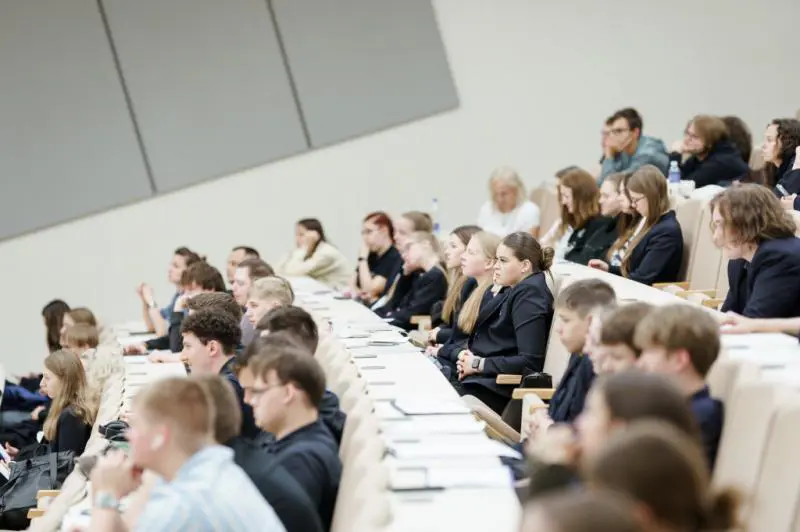Bringing industry expertise to students
Omega 365 Lithuania is strengthening its collaboration with Klaipėda University by bringing real-world industry knowledge into the classroom. Giovanni Di Noto and Aleksandr Narožnij offer students practical insights, supporting both student growth and bridging the gap between academia and industry.
Published: 15. October 2024
Giovanni Di Noto, Product Manager for Pims Project Controls, is currently leading courses on 'Cybersecurity' for Bachelor students, 'Cybersecurity for Ports & Maritime Industries,' and 'Industry 4.0' as part of a micro-credential program. In early 2025, he will teach 'Information Systems Security' for master's students. Giovanni sees this role as a natural extension of his work at Omega 365.
“I joined Omega 365 Lithuania five years ago with the clear goal of sharing knowledge and experience with the next generation of leaders. This succession management goal hasn’t changed. Accepting the request to join Klaipėda University, one of Omega 365 Lithuania’s key social partners, felt like a natural fit and perfectly aligned with my goals,” says Di Noto.
 Giovanni Di Noto, Product Manager for Pims Project Controls at Omega 365 Lithuania.
Giovanni Di Noto, Product Manager for Pims Project Controls at Omega 365 Lithuania.
Practical approach in teaching
In his courses, Di Noto incorporates real-world challenges to equip students with practical skills.
“Aside from proven pedagogical methods gained over hundreds of change management projects, I always provide historical and other contexts when introducing a subject. Referring to real-world challenges is handy and highly relevant with any technology. For bachelor's students, lectures are always paired with practical simulations and exercises. The same goes for master's students, who are regularly exposed to tough topics and thrown into challenging debates.”
Di Noto emphasizes that these approaches not only teach technical skills but also develop soft skills such as critical thinking, communication, and decision-making.
“Challenges and friction are natural ingredients for any type of effective learning,” he adds.
Aleksandr Narožnij, Software Engineering Expert, who teaches "Modern Software Engineering" for Master students, focuses on hands-on learning as well. His role as an associate professor involves organizing practical exercises, where students work in small Scrum teams to build IT solutions for startup projects they develop themselves.
 Aleksandr Narožnij, Software Engineering Expert at Omega 365 Lithuania.
Aleksandr Narožnij, Software Engineering Expert at Omega 365 Lithuania.
“Joining the academic world and becoming a lecturer wasn't a planned decision; I was invited to step in at the last moment to fill a vacancy. Now, after seven years of lecturing, I have no regrets,” says Narožnij.
“I find great joy in guiding students through the different stages of developing an IT system startup, from the initial idea and vision to requirement gathering, planning, modeling, implementation, and testing.”
Industry preparation and collaboration
Both lecturers bring a wealth of real-world experience to their teaching. Di Noto’s cybersecurity courses cover all seven OSI security layers and dive into compliance with legislation like NIS2, DORA, and EU AI regulations. His courses also address IT/OT integration challenges, supply chain attacks, and risks associated with outdated equipment firmware.
“In addition to traditional cybersecurity, we explore emerging issues like adversarial inference models, synthetic data, and quantum-resistant encryption,” Di Noto explains.
“Industry 4.0 courses go beyond technology, examining the socioeconomic impacts of new business models and topics like ESG (Environmental, Social, and Governance), including unsolved challenges such as circular calculations for supply chain operators.”
Narožnij's teaching, meanwhile, allows students to work on projects that tackle real-world problems, such as public procurement systems or car-sharing platforms.
“By working on these projects, students gain practical experience in tackling relevant industry problems. We use the Scrum methodology to organize work within teams, guiding students toward building a Minimum Viable Product (MVP) for their chosen project. This hands-on approach not only familiarizes them with agile practices but also enhances their teamwork, problem-solving, and time management skills,” says Narožnij.
Building stronger connections
In addition to teaching, Narožnij is involved in supervising and reviewing students' theses.
“It’s incredibly rewarding when students engage with real-world challenges in their research,” he says.
“For example, some students have implemented AI solutions to enhance tag scrapping of P&ID drawings or validated fuzzy metadata in documents submitted by contractors. These experiences give students a deeper understanding of the complexities and innovative possibilities within software engineering.”
The collaboration between Omega 365 and Klaipėda University also plays a crucial role in getting to know the academic world better and engaging with the younger generation, understanding how they study, work, and collaborate.
“As lecturers, we get to know students, their ways of thinking and problem-solving. Our partnership with Klaipėda University empowers us to connect with academic, industrial, and scientific circles,” says Di Noto.